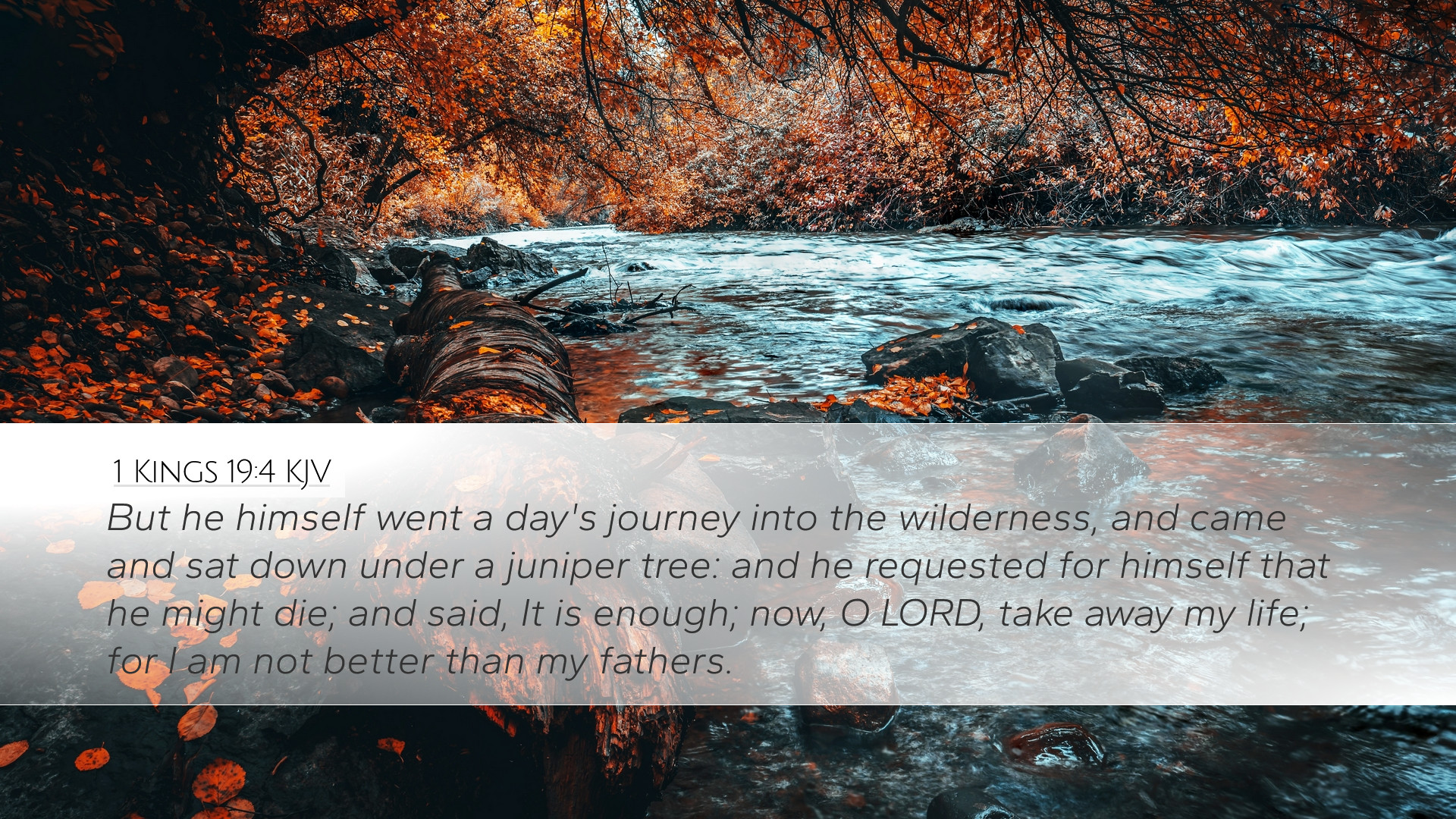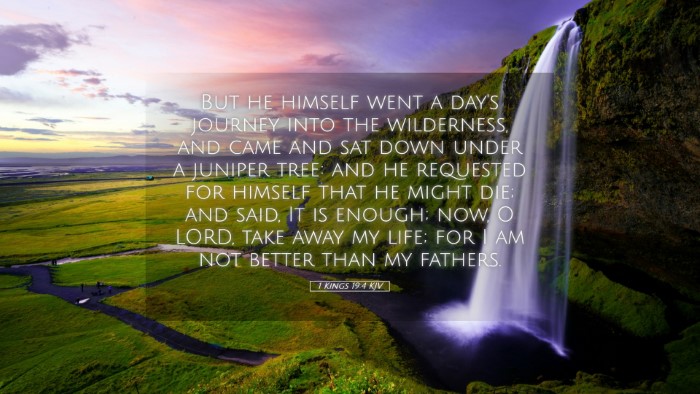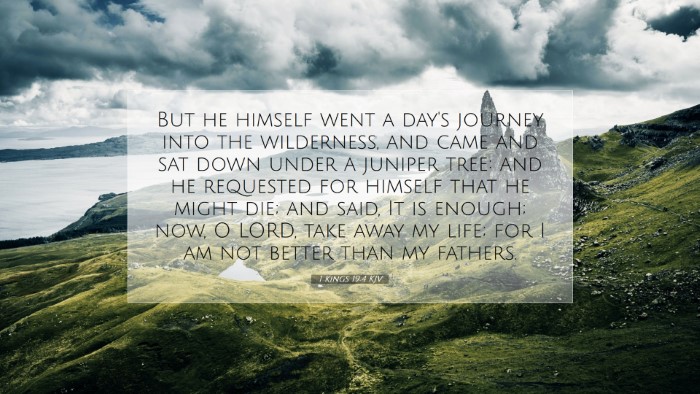Old Testament
Genesis Exodus Leviticus Numbers Deuteronomy Joshua Judges Ruth 1 Samuel 2 Samuel 1 Kings 2 Kings 1 Chronicles 2 Chronicles Ezra Nehemiah Esther Job Psalms Proverbs Ecclesiastes Song of Solomon Isaiah Jeremiah Lamentations Ezekiel Daniel Hosea Joel Amos Obadiah Jonah Micah Nahum Habakkuk Zephaniah Haggai Zechariah Malachi1 Kings 19:4
1 Kings 19:4 KJV
But he himself went a day's journey into the wilderness, and came and sat down under a juniper tree: and he requested for himself that he might die; and said, It is enough; now, O LORD, take away my life; for I am not better than my fathers.
1 Kings 19:4 Bible Commentary
Commentary on 1 Kings 19:4
Verse: “But he himself went a day’s journey into the wilderness, and came and sat down under a juniper tree: and he requested for himself that he might die; and said, It is enough; now, O Lord, take away my life; for I am not better than my fathers.”
Introduction
The passage of 1 Kings 19:4 presents a poignant moment in the life of the prophet Elijah. It follows a significant victory over the prophets of Baal and showcases the prophet's profound despair amid the challenges of ministry. The insights drawn from public domain commentaries such as those by Matthew Henry, Albert Barnes, and Adam Clarke provide a rich understanding of this text, emphasizing the emotional and spiritual states of a servant of God under distress.
Contextual Background
This verse occurs shortly after Elijah's dramatic confrontation with the prophets of Baal (1 Kings 18) and subsequent threats from Queen Jezebel. The courage displayed on Mount Carmel starkly contrasts with the fear and despondency that now engulf Elijah as he retreats into the wilderness. This serves to illustrate the often fickle nature of human experience in relation to spiritual highs and lows.
Matthew Henry’s Commentary
Matthew Henry notes that Elijah’s flight from Jezebel's threats is a testament to his humanity. “The best men are subject to fears, and are sometimes overborne by them,” he remarks, indicating that even great prophets wrestle with despair. Henry emphasizes that Elijah’s desire for death reflects a deep sense of disappointment and failure—not just in his own ministry but in the overall wickedness of Israel.
- Elijah's Despair: Henry suggests that this moment is a classic representation of a prophet struggling with overwhelming circumstances. His request to die reveals a moment of weakness and the classic human response when faced with insurmountable pressures.
- God's Care: Despite Elijah’s despondency, God’s care and provision follow. Henry highlights that this should reassure believers: God does not abandon His servants in their lowest moments.
Albert Barnes’ Commentary
Albert Barnes focuses on the isolation and anguish that often accompany prophetic ministry. “Elijah had come to the end of his resources,” he notes, drawing attention to Elijah’s feelings of inadequacy as a leader. Barnes points out that in the face of opposition, it’s common for an individual to feel unworthy and overwhelmed.
- Significance of the Wilderness: The wilderness represents both a physical and spiritual barrenness for Elijah. Here, it serves as a place of escape but also of profound loneliness.
- Desire for Death: Barnes elucidates that Elijah’s request to die underscores a critical point: “He wished to escape from his present troubles and was convinced that death would be preferable.”
Adam Clarke’s Commentary
Adam Clarke expands on the implications of Elijah’s despair. He states, “There is something very affecting in the prayer of Elijah in this instance.” Clarke highlights that Elijah, having successfully challenged the idolatry in Israel, expected immediate national repentance, but when that did not occur, he felt utterly despondent.
- Theological Reflections: Clarke emphasizes the importance of understanding divine timing and the often gradual process of spiritual awakening in a nation. Elijah’s expectation was misaligned with God’s plan.
- God’s Response: Clarke notes that God’s response to Elijah is significant. Instead of a reprimand, God offers care and sustenance—indicative of grace amidst failure.
Spiritual and Theological Implications
This verse invites deep reflection on several key themes pertinent to pastoral ministry and Christian life:
- The Human Condition: The narrative encapsulates the struggles of despair prevalent in the lives of believers, reminding us that even those called to lead can experience profound discouragement.
- God’s Grace: An emerging message is the unshakeable grace of God. Elijah’s experience underscores that God meets His people in dark places, providing nourishment and support.
- Expectation vs. Reality: The contrast between Elijah’s expectations of immediate change and the reality of God’s plan serves as a reminder of the complexity of divine providence. Leaders must be prepared for seasons of trial that may not align with their desires.
Conclusion
In conclusion, 1 Kings 19:4 is a profound reminder of the struggles of faith amidst opposition and despair. The combined insights from Matthew Henry, Albert Barnes, and Adam Clarke highlight the nuances of Elijah’s experience, offering a well-rounded perspective on the challenges of spiritual leadership. Pastors, students, theologians, and Bible scholars can extract valuable lessons regarding human frailty, divine grace, and the importance of resilience in the journey of faith.


